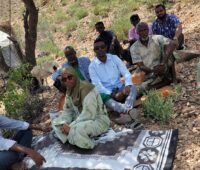Environmental disasters in recent decades have drawn scholarly attention to the need to move beyond traditional area studies boundaries in order to understand the wide-reaching impacts of events like tsunamis, cyclones, and, more broadly, climate change. This essay reflects on the efforts of one research team, led by Nathalie Peutz and Alden Young, to disrupt regional divides between East Africa and the Arabian Peninsula, and to study climate change across the littoral states of the Red Sea arena. As the authors highlight, successful collaboration across regions and in this time of multiple crises entails the constant negotiation of constraints and disruptions.















